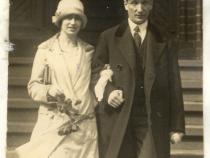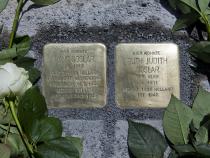Hans Goslar was born on November 4th, 1889 as son of Jewish parents in Hannover, where he lived through the first years of his childhood. When he was six, his parents decided to move to Berlin. He went to primary and secondary school there. After accomplishing his finals, Hans Goslar passed the exams in national economy at the commercial college of Berlin and wrote for the business section of different newspapers. In December 1914, he started to work in the editorial team to the business section of the Vossische Zeitung.
In 1915, Hans Goslar did his military service in the reserve of the German army and in 1916, he was assigned to the press administration of the headquarters of the commander-in-chief East.
He then changed to the German administration of Lithuania in August 1916, where he edited the Lithuanian newspaper Dabartis in Kowno. In February 1917, he started working for the administration upper-East. In Białystok he then worked for the Białystok newspaper, from May on he worked for the military administration of Lithuania. He was then discharged because the publishing house of the Norddeutsche Zeitung requested him. He was editor of the paper between April 1918 and September 1919.
Even though Hans Goslar joined a Zionist youth movement as a young man, his faith grew considerably in Eastern Europe. Here, he came in touch with the religious concept of mystic power of the Eastern European Jewry and regarded this form of religion highly. From this point of time on he believed it to be his duty to actively perform his Jewish faith.
From 1919 on, he was head of the public relations department of the Prussian state ministry. And long before the Nazis came into power, he was a dedicated social democrat and a devout Jew. This led to his indefinite suspension, being politically motivated in 1932.
Hans Goslar married Ruth Judith Klee in 1926. She was a teacher and 12 years younger than him. Two years after the wedding, their first daughter, Hannah Elisabeth, was born. In 1935, the family emigrated to the UK, Hannah was now seven years of age. But Hans could not find sufficient work there, as his employers did not allow him not to work on Sabbath. Thus, Hans Goslar decided to move to the Netherlands in the same year with his wife and daughter. This was meant to be only one step on the way to Palestine – after all, he had been a dedicated Zionist for decades. With the help of his wife and a solicitor, Hans established an office for impoverished Jewish refugees on Merwedeplein in Amsterdam. He seldom brought himself to take more than a minimum consultation fee from the emigrants in distress. And so the economic situation in the house of the former chief press officer was difficult, even though he worked hard and with a lot of commitment. But in most cases there was no money left for unnecessary luxury like ice skates for Hannah. The birth of the second daughter Rachel Gabriele in October 1940 did not improve the economic situation of the family. Hannah was very proud of her little sister and cared lovingly for her. Two years later, Hannah’s and Rachel’s mother died giving birth to her third child, which also did not survive.
The family of Anne Frank, who were good friends, usually came over on Friday evenings to partake of the Sabbath meal with the Goslar family and they also celebrated Passover together. As already mentioned, Hans Goslar was very religious – nonetheless he allowed his daughters to participate in the Christmas festivities of their school. They also could take part in the feast of the Frank family, who celebrated Christmas.
Three years after the German army had occupied the Netherlands the Goslar family was arrested on June 23rd, 1943 in the last big raid of Amsterdam and brought to Westerbork, a detention camp in the North of Holland. Due to the protection of the so called “Palestine list” they were able to remain for 8 months in Westerbork – which was a big exception – before they were deported to the concentration camp of Bergen-Belsen as “exchange Jews”. Hans Goslar died on February 25th, 1945 in consequence of the inhuman living conditions in the concentration camp. His daughters survived; Hannah lives in Jerusalem today and her sister Rachel lives in Petach Tikva, near Jerusalem.
His family describes Hans Goslar as a realist, sometimes even as a pessimist. But seen from today, his estimation of the future was a realistic one.
He nonetheless was a humorous and very helpful man, who only wanted the best for his fellow humans and stood up for his belief and his political ideals.
Hans Goslar
Location
Große Querallee / Ecke Paul-Löbe-Allee
Historical name
In den Zelten 21a
District
Tiergarten
Stone was laid
09 June 2015
Born
04 November 1889 in Hannover
Occupation
Pressechef des preußischen Staatsministeriums
Escape
1933 Flucht in die Niederlande
Verhaftet
in
Westerbork
Deportation
on 15 February 1944
to
Bergen-Belsen
Murdered
25 February 1945 in Bergen-Belsen




